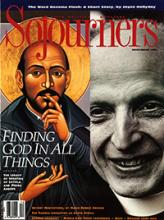The ineffable John Gotti of Mafia fame is reported to have stated recently, with considerable passion, the following (The statement was taken from an FBI phone tap; one cannot therefore guarantee its accuracy. How does the saying go, "To catch a thief ..."?).
Anyway, I quote: "This is gonna be a Cosa Nostra till I die. Be it an hour from now, or be it tonight, or a hundred years from now, when I'm in jail. It's gonna be a Cosa Nostra."
Matters of grammar aside, and though his constituency and mine, and possibly our worldview, might be thought to differ, let one thing be clear. I am rapt in admiration for such, shall we say, contumacious pertinacity.
Mr. Gotti, if one can credit the reports, early in life came on a good thing. Or was born to it. But in any case, at some point he said something fairly seminal to his own soul. "Cosa nostra till I die" perhaps?
A child genius, a sort of "padrone" saint for the times? In any case, he pursued his calling with fervor. His career might therefore be thought of, in a generously Christian sense, and without pushing things, as a vocation of sorts.
More, as a metaphor joined to a larger scope of criminality in more exalted places. As shall appear hereafter.
Possibly readers have already come on my drift. Which is to say, for a number of years Mr. Gotti and I have, each of us, in a manner of speaking, stuck to our guns.
The following is perhaps redundantly stated here. Concerning matters that might be judged peripheral, for example, silk suits, ample girth, tanned jowels, prowling bodyguards, limos, perks of all description, I will not cavil. Gotti surpasses me by a mile or more.
Read the Full Article

